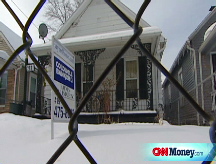Foreclosure fix: Heat is on Obama team
Lawmakers and regulators push for moratorium until administration's plans unveiled. Federal officials confer on housing crisis.
NEW YORK (CNNMoney.com) -- A day after Treasury Secretary Tim Geithner said it would be a few weeks before he unveils a solution for the housing crisis, regulators and lawmakers pressed financial institutions to suspend foreclosures until the plan comes out.
Geithner, who laid out a broad overview of the Obama administration's plan to attack the financial meltdown, said Tuesday that the federal government would commit $50 billion to preventing foreclosures by reducing monthly payments. Details would be forthcoming, he said.
Until that loan modification plan is released, foreclosures should be halted, some say.
"I would ask all of you now to please make sure that we have a moratorium in effect," Rep. Barney Frank, D-Mass., told top bank executives at a hearing Wednesday. "It would be until we get that program, and until you know if people can qualify. Having someone suffer foreclosure because two weeks hadn't gone by for this program would be unacceptable."
The chief executives of Bank of America (BAC, Fortune 500) and Citigroup, (C, Fortune 500) two of the nation's largest servicers, told lawmakers they would agree to halt foreclosures temporarily. The head of Wells Fargo (WFC, Fortune 500) said it already has a moratorium in effect for loans serviced by Wachovia, which Wells Fargo acquired last year.
Frank said more banks are likely to comply with his request.
"I believe you will get well over 95% of the banks to hold off," Frank told reporters Wednesday. Banks know foreclosures "are not in their interest."
Meanwhile, the Office of Thrift Supervision urged the more than 800 institutions it regulates to suspend foreclosures until the administration's plan is finalized.
"OTS-regulated institutions would be supporting the national imperative to combat the economic crisis by suspending foreclosures until the new plan takes hold," OTS Director John Reich said Wednesday.
Several institutions -- including JPMorgan Chase (JPM, Fortune 500), Fannie Mae (FNM, Fortune 500) and Freddie Mac (FRE, Fortune 500) -- had put foreclosure moratoriums in place while they've gotten their loan modification plans up and running. Some states, including Massachusetts, have instituted short-term foreclosure bans. Even Obama during the transition called for a moratorium. The goal is to give borrowers more time to work out an affordable payment schedule.
These efforts are having an impact, at least in the short-term. Foreclosure filings -- default notices, auction sale notices and bank repossessions -- were reported on 274,399 properties during January, down 10% from December, according to RealtyTrac, an online marketer of foreclosed homes. RealtyTrac attributed a large part of the decline to foreclosure moratoriums.
Skeptics, however, say the moratoriums merely delay the inevitable.
Treasury and federal housing officials met Wednesday behind closed doors for 90 minutes with industry representatives and community advocates to discuss the housing plan. The administration listened to proposals for how to address the mortgage meltdown.
A number of people at the meeting stressed the need for a standard model for streamlined modifications, according to participants. They also suggested the administration use part of the bailout funds to help delinquent borrowers get into affordable mortgages by subsidizing interest rates or forgiving principal.
"They are moving at a good clip to get it done, but they want to make sure they get it right," said John Dalton, president of the Housing Policy Council and a founding member of Hope Now, a coalition of servicers, investors and community groups focused on foreclosure prevention.
Officials met Thursday morning with more financial institutions, consumer groups and trade associations to continue the listening session. Geithner was also scheduled to attend a White House meeting with Obama's economic team to discuss efforts to stem the foreclosure crisis.
Still, many in the industry and on Capitol Hill are surprised at the time it's taking the administration to announce a foreclosure fix, particularly since Obama blasted the Bush administration for delay on the issue.
"One thing I'm determined is that if we don't have a clear focus program for homeowners by the time I take office, we will after I take office," he said on "60 Minutes" in mid-November.
Housing advocates, lawmakers and others want him to stick to that commitment. Elizabeth Duke, a Federal Reserve governor, on Wednesday stressed the need to move quickly.
"It is equally important that the government decide how it wishes to move forward, and then do so," she said in a speech. "As long as uncertainty exists as to the scope and terms of the additional steps that likely will be offered, borrowers, lenders, and servicers will continue to hold out in hope of securing a better deal."
Frank on Tuesday said that he's concerned about the level of resources the administration is committing and the time it's taking to debut a plan.
"First, I'm concerned that $50 billion to reduce foreclosures understates the amount that we will need, and we need some assurance that, assuming this works as we hope it will, there will be more money available," Frank said. "Secondly, the secretary said the administration would present details of their foreclosure reduction plan in a few weeks, which is too much time."
Many housing advocates are urging the administration to come out with its fix quickly. They say the economy cannot be revived until the housing crisis is addressed.
"Foreclosures should be Treasury's number one priority, not something to be done when we get around to it," said John Taylor, president of National Community Reinvestment Coalition. "Within the next few weeks, we will see tens of thousands more homeowners go into foreclosure. Treasury must take control of these toxic loans at a discount and modify them so that people can stay in their homes."
Financial institutions need to be more aggressive about modifying loans en masse, advocates say.
Lenders and loan servicers need to reduce payments to no more than 28% to 31% of a borrowers' income, which may entail forgiving part of the principal if need be, said Marietta Rodriguez, director of the national homeownership program for NeighborWorks America.
"They need to modify loans so financially the family has room to deal with other expenses in their lives," Rodriguez said. ![]()



